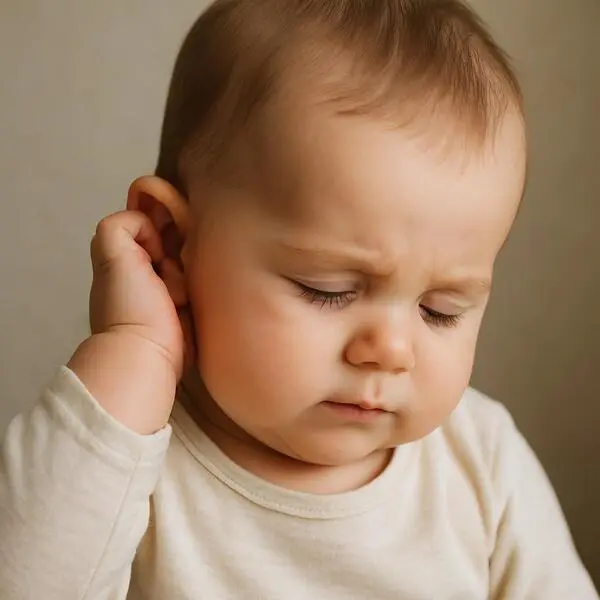- Why Does My Baby Rub Their Ears?
- Is Ear Rubbing in Babies Normal?
- What Causes Babies to Rub Their Ears?
- When to Worry About Ear Rubbing
- How to Treat or Prevent Excessive Ear Rubbing
- Final Thoughts on Baby Ear Rubbing
Why Does My Baby Rub Their Ears?
Babies exhibit a range of behaviors that often leave parents puzzled. One such common action is when a baby keeps rubbing or tugging at their ears. Why does my baby rub their ears? This question arises frequently, especially among new parents concerned about potential infections or health issues. While ear rubbing might indicate a problem, it’s often a normal developmental behavior. Therefore, understanding the causes and distinguishing harmless habits from medical concerns can help ease parental anxiety.
Is Ear Rubbing in Babies Normal?
Yes, in many cases, ear rubbing is a completely normal behavior in infants between 4 to 12 months of age. At this stage, babies are learning about their bodies. Touching or pulling at the ears is often just part of this natural exploration. In fact, it’s usually seen as they gain control of their hands and fingers. Consequently, it should not be a cause for concern unless accompanied by other symptoms.
What Causes Babies to Rub Their Ears?
Common Causes of Why Babies Rub Their Ears
Self-Discovery and Habit Formation
Babies love to explore. Discovering ears is just like discovering toes! As they develop fine motor skills, they may become fascinated with their ears and touch or tug them out of curiosity. Fortunately, this behavior typically fades once the novelty wears off.
Self-Soothing Mechanism
Some babies rub their ears as a way to relax themselves. Similar to sucking thumbs, ear rubbing can be a form of self-soothing, especially before sleep or when they’re tired. As a result, you may notice it more during nap time or bedtime routines. Moreover, it often correlates with your baby’s overall mood and comfort level.
Earwax or Itchiness
A buildup of earwax or exposure to irritants like soap or shampoo can cause an itchy ear canal. In response, babies might rub or poke their ears. To prevent this, it’s best to avoid cotton swabs, which can push wax further in. Instead, focus on gentle outer ear cleaning methods.
Teething Discomfort
The connection between the mouth and ears through shared nerve pathways means teething can cause sensations in the ears. Consequently, babies might rub their ears to cope with teething pain, often alongside drooling, gum rubbing, or mild fever. In addition, you might notice increased irritability during this time.
Cold-Related Illness or Ear Infections
A baby pulling at their ears might also be experiencing discomfort due to a cold or an ear infection. In such cases, look for symptoms like:
- Crying
- Fever
- Poor sleep
- Ear discharge
- Irritability
Additionally, if your baby has recently recovered from an illness, they might still experience lingering symptoms, including ear discomfort.
Otitis Media with Effusion (OME)
This condition involves fluid accumulation behind the eardrum without signs of infection. It’s more common after a respiratory illness and may cause ear pulling due to pressure buildup. Thus, if your baby had a recent cold, keep an eye out for this condition. Importantly, OME often goes away on its own, but medical guidance is still essential.
Skin Sensitivity or Allergies
Reactions to fabrics, shampoos, or detergents can cause itchiness around the ears. Babies with sensitive skin or eczema may scratch the area more frequently. Additionally, switching to hypoallergenic products might help. Furthermore, keeping a record of any new products introduced can help identify irritants.
When to Worry About Ear Rubbing
Most ear rubbing is harmless, but in some cases, it can indicate an issue that needs medical attention. Therefore, monitoring your baby’s overall behavior is key. Moreover, it’s important to consider any new or additional symptoms that develop.
Seek Medical Advice If:
- Your baby has a fever over 38°C (100.4°F)
- There’s ear discharge
- Your baby seems very sick or unusually fussy
- Ear rubbing lasts more than 3 days
- There are cold or flu symptoms accompanying the behavior
If any of these signs are present, a prompt visit to the pediatrician is highly recommended.
How to Treat or Prevent Excessive Ear Rubbing
Safe Home Remedies and Prevention Tips
- Keep ears dry and clean. Avoid letting water or soap enter the canal.
- Don’t use cotton swabs. Instead, clean the outer ear with a damp cloth.
- Use white vinegar drops (equal parts vinegar and warm water) for mild itchiness—but only with doctor approval.
- Cold pacifiers or gum massage can soothe teething-related discomfort.
- Use hypoallergenic products for bathing and laundry to reduce skin irritation.
In addition, maintaining a calm environment can help soothe a fussy baby who’s rubbing their ears.
Final Thoughts on Baby Ear Rubbing
Seeing your baby constantly rub their ears can be worrying, but it’s often part of normal growth. Still, it’s important to watch for other symptoms that may indicate infections or allergies. Why does my baby rub their ears? It might just be curiosity—or it might be a sign of something more. When in doubt, consulting a pediatrician ensures your baby gets the care they need. Ultimately, staying observant and responsive is the best approach.
The following post may interest you
Why Does My Baby Spit Up After Every Feeding?
Sources
Why do infants pull their ears?
https://www.sciencedirect.com/science/article/pii/S0385814618300397
THE FIRST TWO YEARS
https://pure.mpg.de/rest/items/item_2383176/component/file_2383175/content

